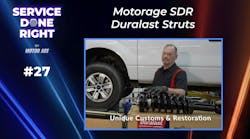With so much going on every day for a tool dealer to keep track of, it is easy to overlook a basic function that any sales business needs: A system to capture and recall the information about what your customers are asking for. Every day, customers want something from you. They want you to order a tool, to check on a tool that has been ordered, to see if a type of tool even exists or perhaps to ask for something specific that may not be in your catalog, but may be readily available.
Think about how you deal with these requests.
1. Do you hear these requests from technicians and figure you will remember them later? Then, do you go out and start the truck and drive on to the next shop? How long is your memory? Next week, when you go into the shop, what do you say when that customer asks you about that special request? If you didn’t remember it, you either stand there with a dumb look on your face, tell them you couldn’t locate the special tool, or worse yet, say it is on “back order.” While they may appear to be forgiving, they are thinking that they have a choice of maybe three other tool trucks, brick-and-mortar stores or the Internet to try instead.
2. Or do you walk in, greet the customer, and before they even ask, show them the item they asked about, or give them the information they wanted? The customer probably buys the tool, or responds positively to the information. You have instantly made an impression.
YOU NEED A SYSTEM
The most successful distributors have a clear system to capture these requests from the customer. One of the most successful tool dealers I know said to make sure that before you start that truck and leave the shop, you write down, or somehow capture, all of these requests before you drive out of the parking lot.
Technology will do little for you if you do not take this step.
A note-taking system can consist of a basic low-technology approach. Most tool dealers (at least the ones that want to sell tools) carry a tray or tool bag with them. It is easy to put a clipboard in there for taking notes. You probably print a route sheet that allows you to write notes under the customers’ names while you are in the shop. If you don’t like to do that, consider carrying a legal pad or a small memo notebook in your shirt pocket. If you use separate paper like this, make certain that you accurately label your notes with the date and time. This could save you a great deal later.
Another possibility is to carry a small digital voice recorder. I like these, because at the push of a button, the voice recorder takes notes quicker than we will write things down. Also, with a digital recorder, there is no tape to mess with. Most PDAs and Smart phones have a way to record voice notes. These have the advantage of storing the voice notes as a digital audio file that you can listen to later, or be transferred to your computer. There, you can organize them into folders by day of the week, date, shop, or any filing method. Some recorders name these files by the date and time automatically, which makes an easy reference point.
USING THE NOTES
Any notes that you are careful enough to take will not do any good if you can’t find them when you need them. Have you ever seen scraps of paper, or Post-It notes, stuck everywhere around the desk on a tool truck? There is no way the information on those notes is accessible when needed. How about when the voice notes stay in the recorder, and are never listened to again?
These notes don’t help anyone if you don’t look at or listen to them again. Set a time to review your notes. This is your time to act on everything that you have written down; place orders, check product, or whatever else they require. Set a fixed time every day to do this. (Consider writing a journal entry about the day, including the weather, what you carried for tools, special sales and any unusual events of the day. You never know when that information might come in handy.)
Note-taking is a foundational building block to a strong business. You will impress the customer when you remember what they asked about. Although they expect it, they will still be grateful when you call them when you said that you would. They will continue to buy from you. You will get the reputation as the one who is on top of things. Your business will grow, just by taking care of the small details that not everybody does. With so many choices of where to purchase tools, it is extremely important to set yourself above the competitors in any way possible.
In the next issue, I will cover ways to move your low-tech notes to the next level with some high-tech examples for greater efficiency.
Woodman is an IT consultant and former mobile tools distributor based in Maine.

